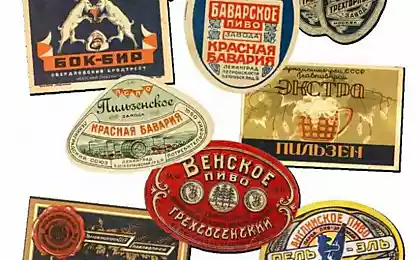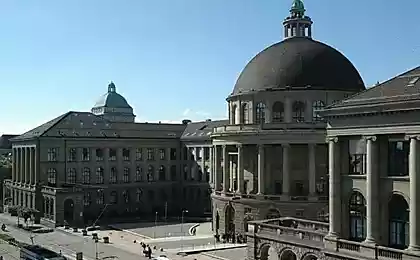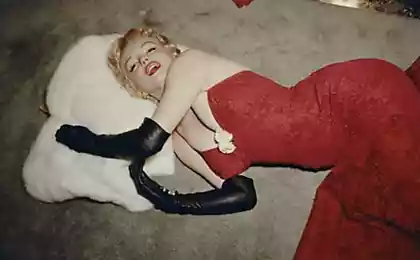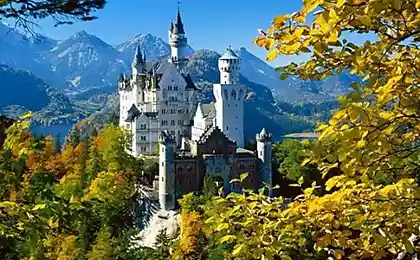862
Munich Agreement (29 photos)
The author writes, lord-k:
Munich, September 30, 1938
Seventy-one years ago, the head of the four powers signed an agreement known Bavarian capital. Let (with appreciation to the Life and Bundesarhivu) look at the actors and some decorations.
Let's start with the British Prime Minister Neville Chamberlain.
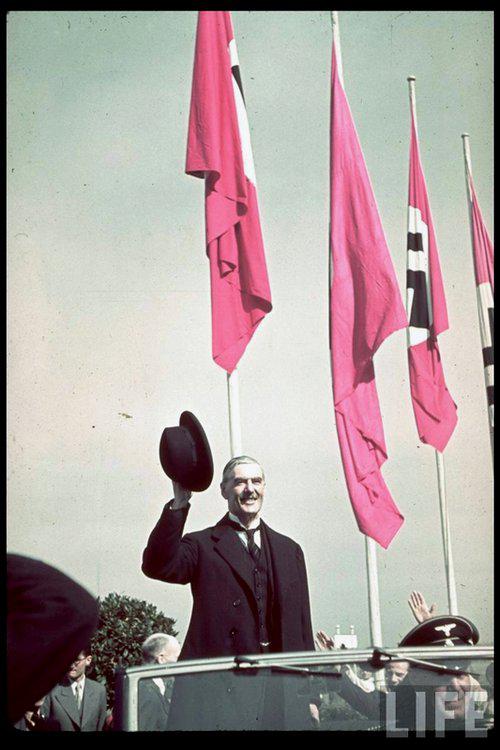
Four-conference was held in Munich Fuhrerbau (author of the project - Paul Troost). Construction of the building was over a year earlier.
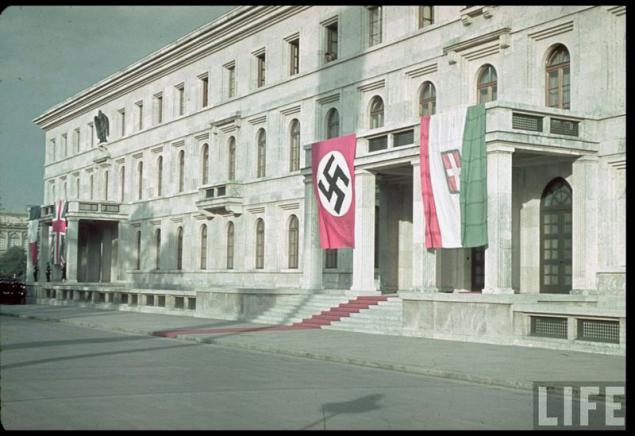
Above each entrance - the two flags.
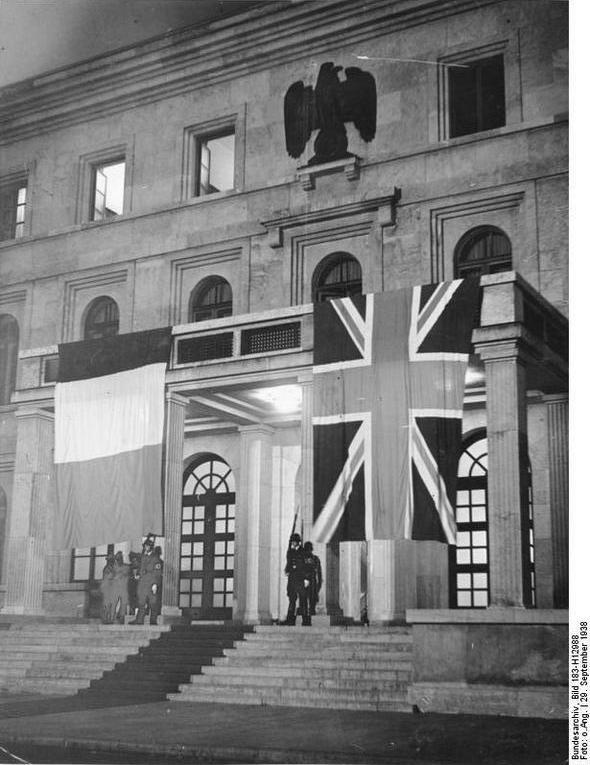
Spacious interiors are in a position to fruitful work for peace in Europe.
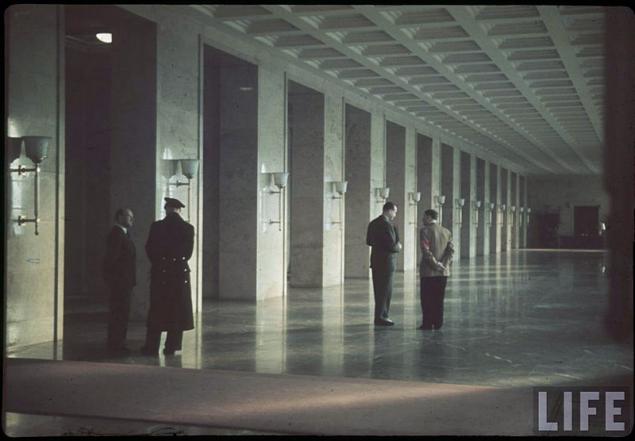
Honor guard at the Munich airport Oberwiesenfeld.
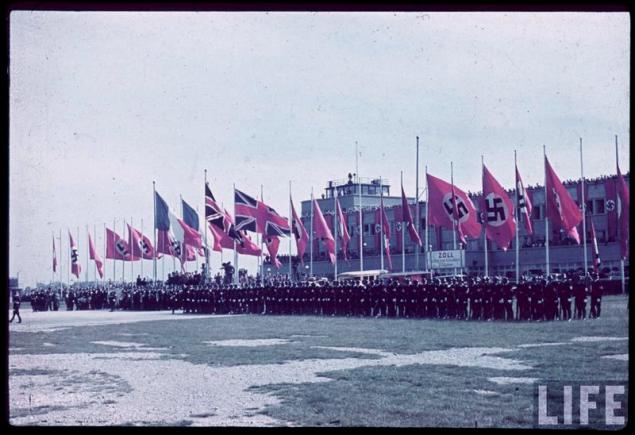
Back to Chamberlain. Two weeks before the conference of the four powers, he visited Bavaria. He met Hitler in Obersalzberg. The meeting outlined the main provisions of the future agreement.
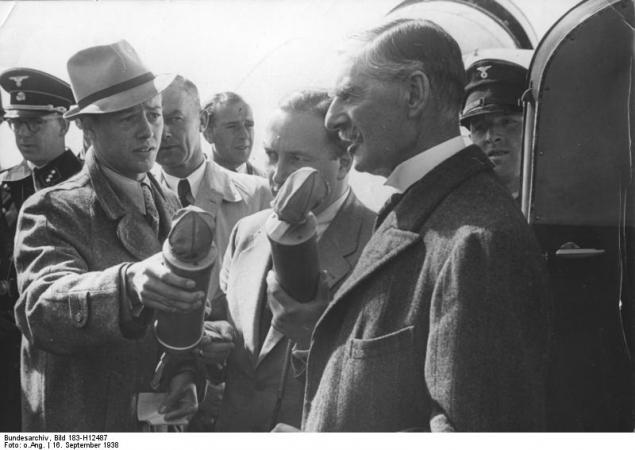
After completing his short visit, Chamberlain immediately convened a Cabinet. His Majesty's Government has approved an agreement reached with Germany. The next day, Sept. 17, arrived in London the Prime Minister and the Foreign Minister of France, who were briefed on the outcome of the meeting and expressed their full support for the British colleagues.
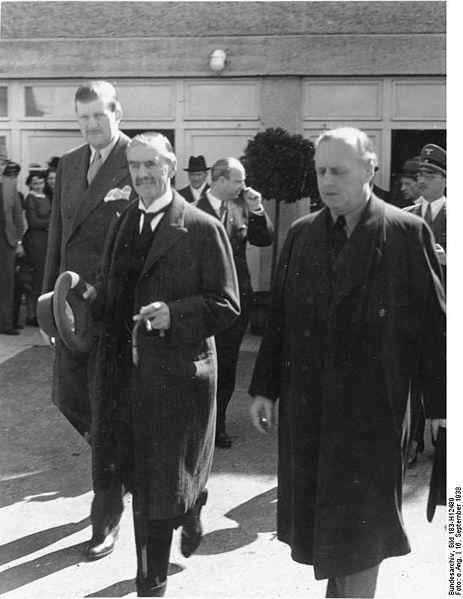
So Chamberlain again in Munich.
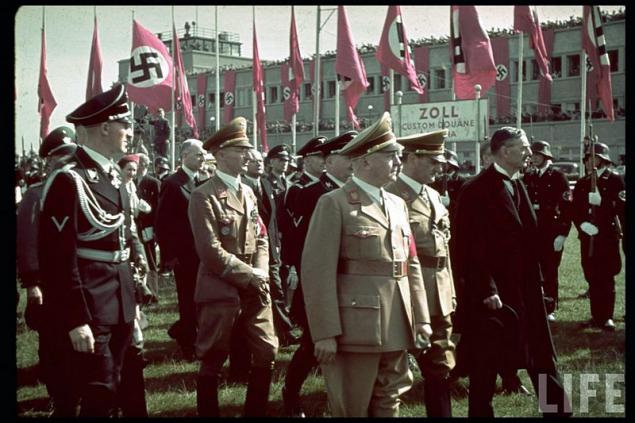
Benito Mussolini arrived in Munich, not for peace or territorial gains. In Duce had other tasks which he successfully completed.
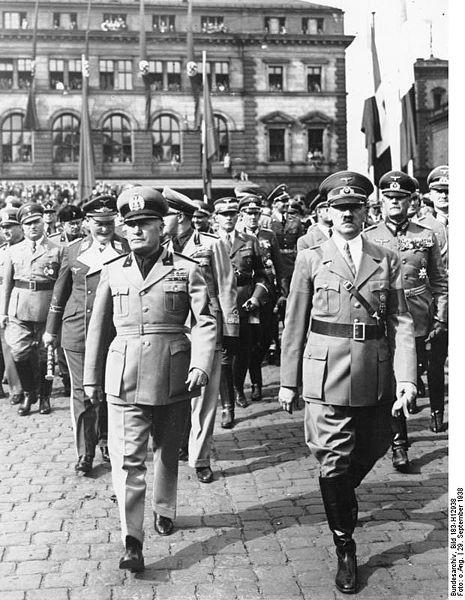
The man who for many years avoided traveling abroad, who recently was condemned by the League of Nations for its aggression against Abyssinia, who experienced acute political isolation of his regime, was now able to feel equal among equals.
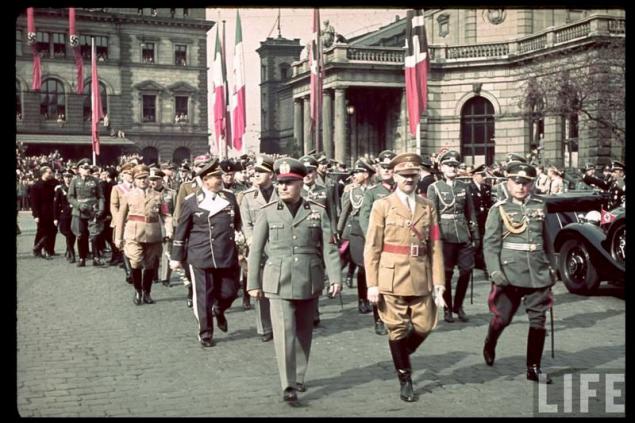
Photographer Heinrich Hoffman captured Mussolini conversation with Chamberlain.
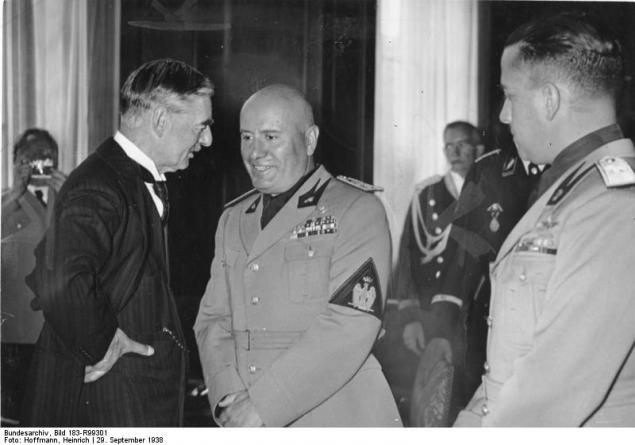
In the rough commoner Duce played only with those whom he considered beneath him on the situation. Before Chamberlain, he certainly appeared in the guise of an educated, witty and attentive interlocutor.
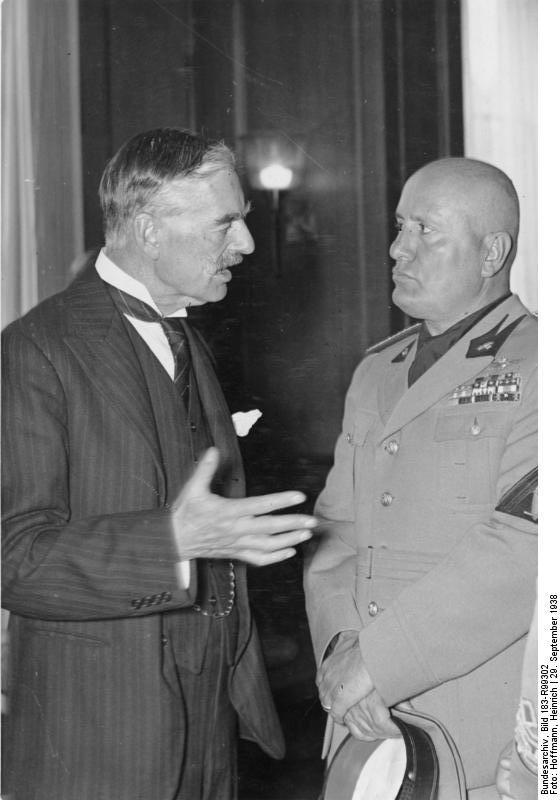
Edouard Daladier, the French Prime Minister, much enthusiasm at the airport experienced.
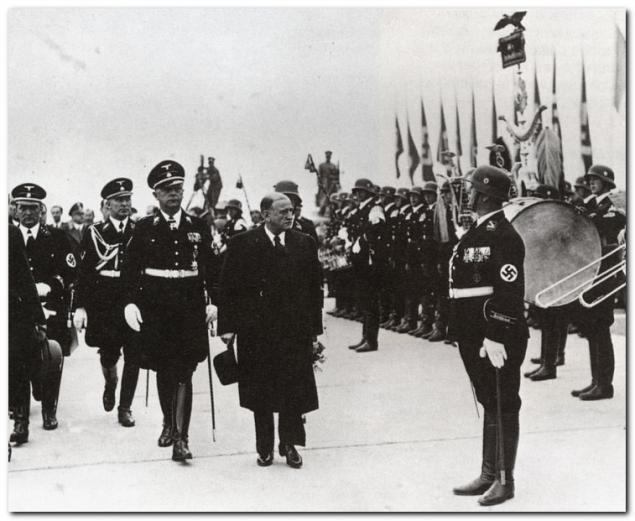
And car trip looked very pale, especially near Hermann Goering.
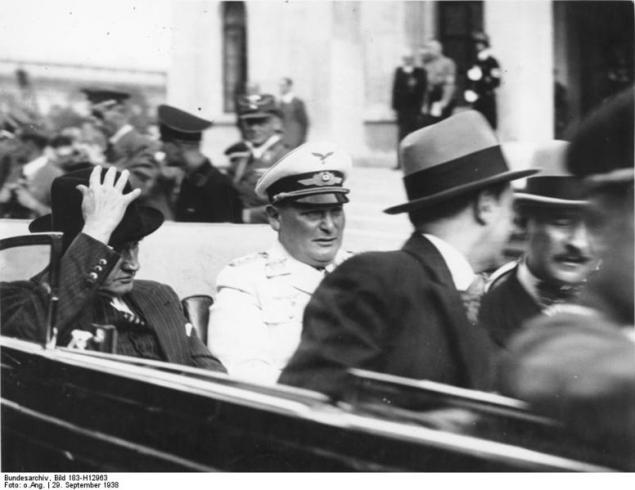
Great shot by Hugo Jaeger did - one of the "court photographer" Fuhrer!
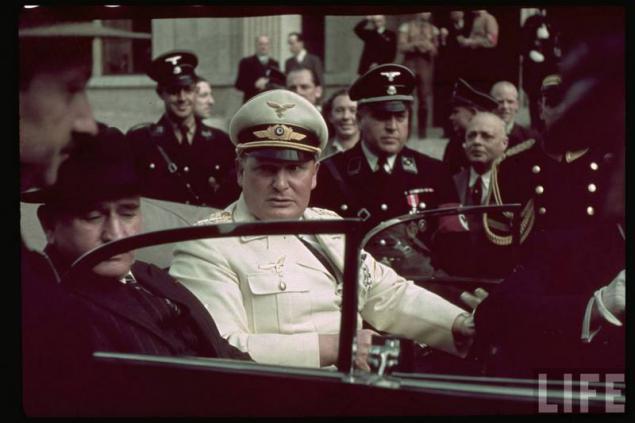
Now it's called "photo-op". Protocol bleak picture.
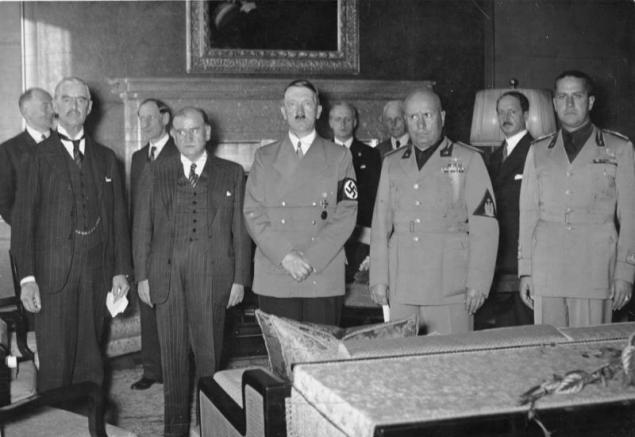
Hitler got what he wanted.
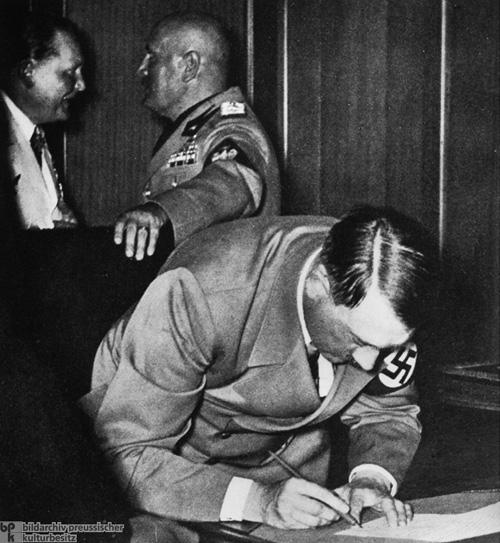
It is done.
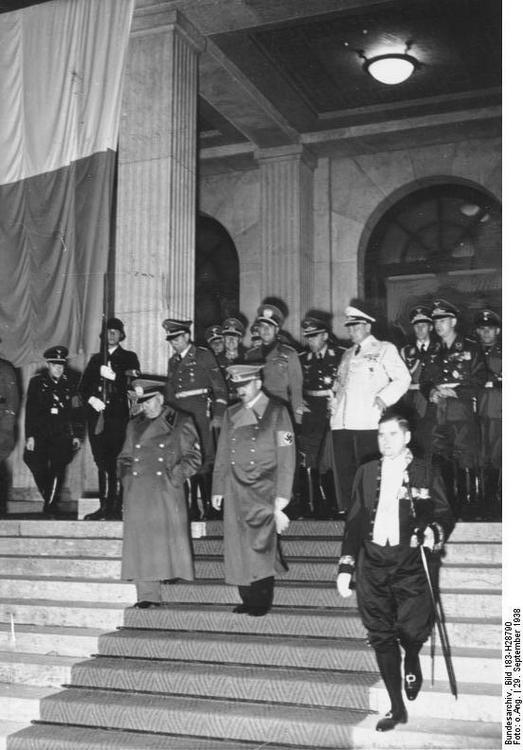
Finished business - walk safely.
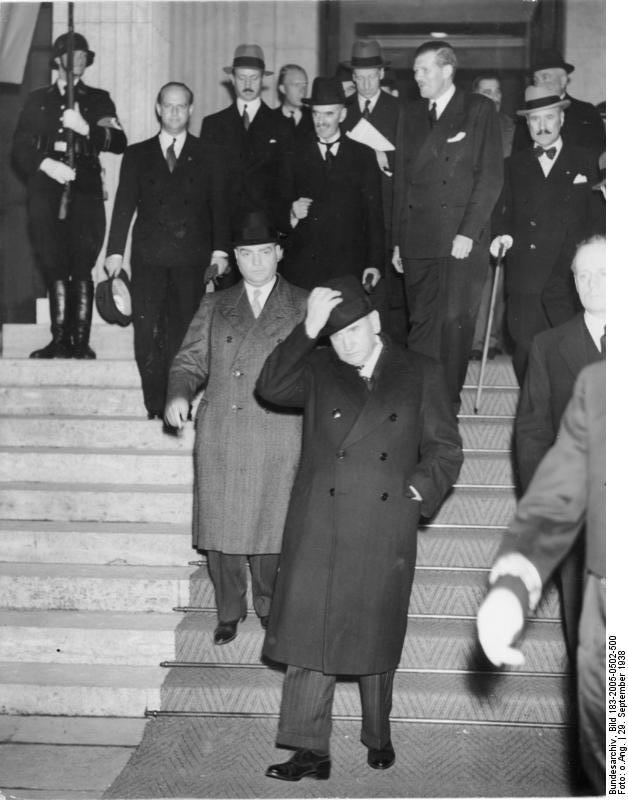
That cheered Daladier. Especially a fellow traveler on the way back he came across a charming, knowing the French language - Joachim von Ribbentrop, the son of a large importer of sparkling wines. However, the fault could talk with Goering. But, apparently, it did not happen.
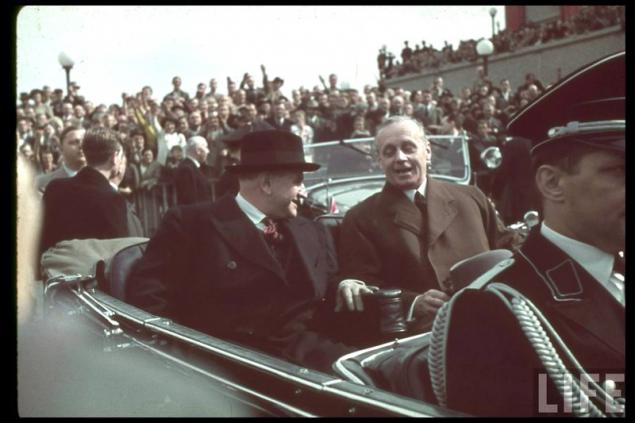
With Chamberlain Ribbentrop spoke explicitly about wine
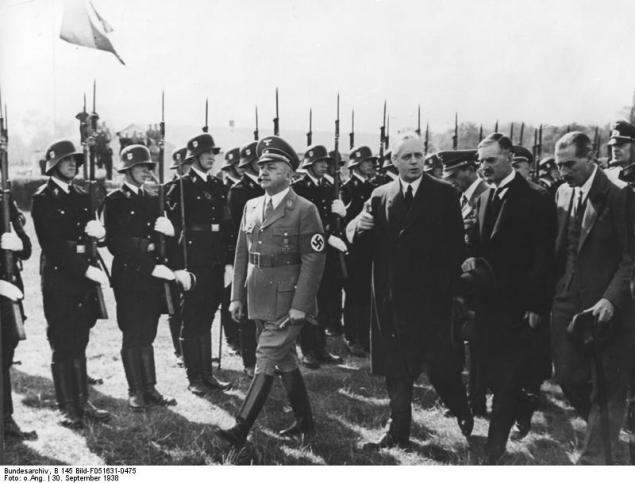
Whatever it was - it was carried out with all the honors.
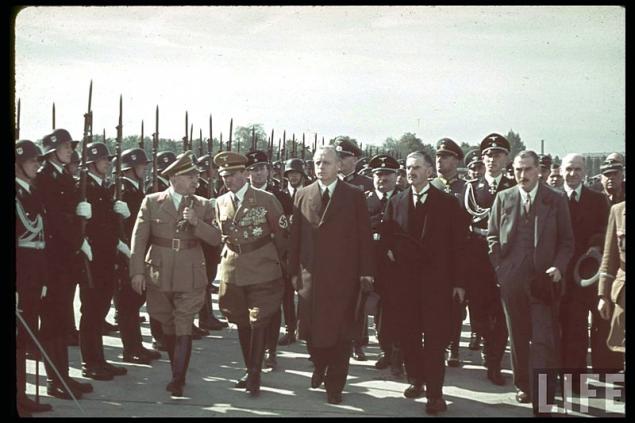
Chamberlain said goodbye to hospitable Munich and went to London to utter his famous paraphrase of Sunday prayers.
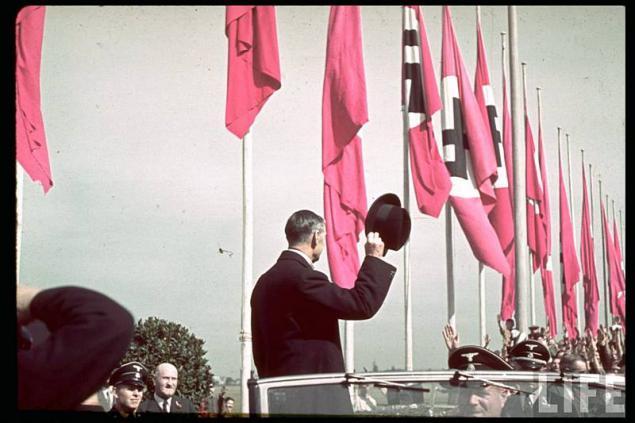
The Sudeten German troops entered the long-awaited. And shed tears of joy.
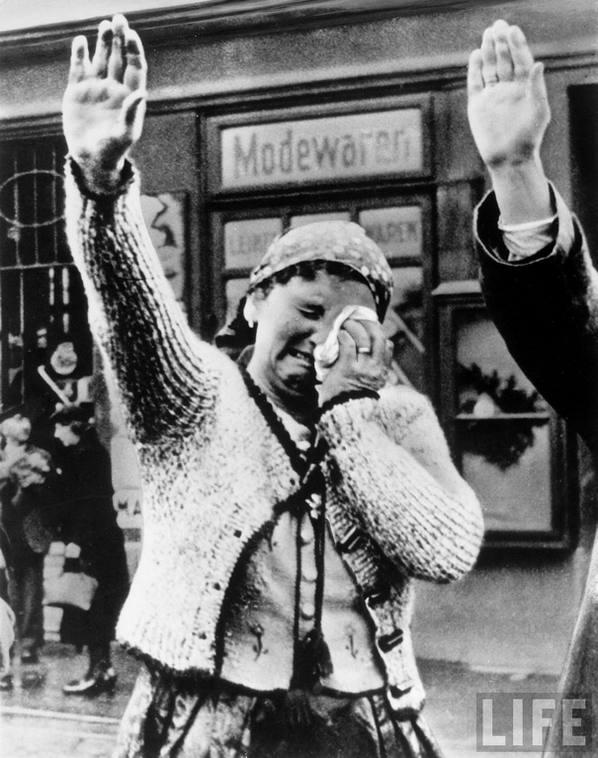
And in the Bavarian capital to do other things. In October, there was open hunting museum.
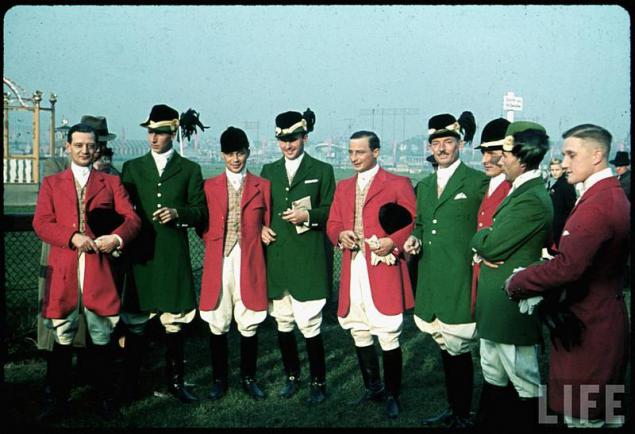
In November, it marks the 15th anniversary of the "Beer Hall Putsch". Here's a lover of music, he is the Führer of the German people and Reich Chancellor, at a rehearsal of the concert.
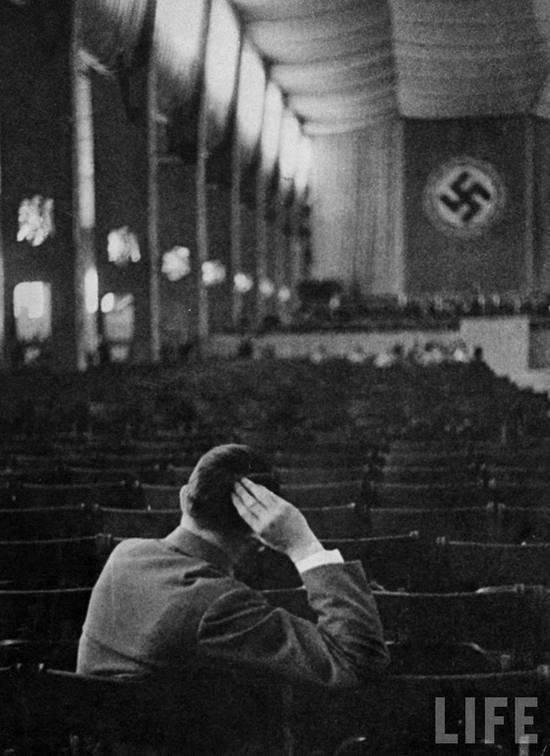
Oath of the SS on the anniversary.
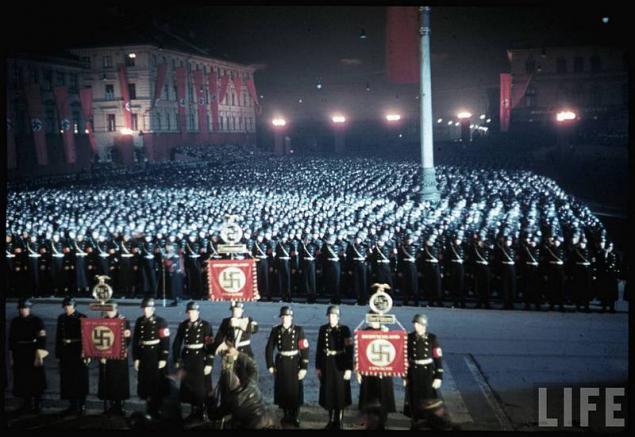
A group of high reenactors.
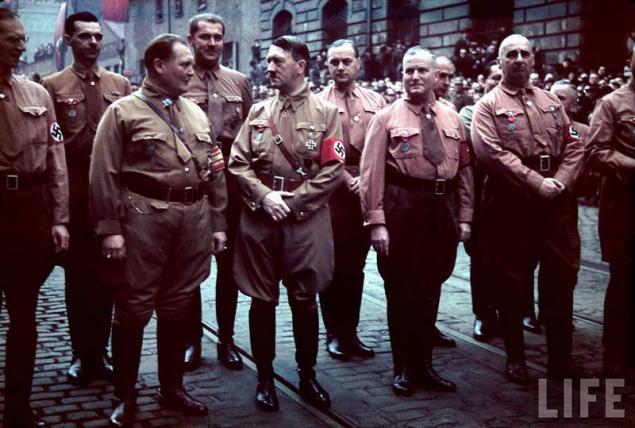
And Viola kameraden divisible memories in the beer cellar "Lowenbrau". Soon many of them will fight.
Perhaps something where I broke the sequence. If you see exactly where - please specify.
And in fact events. Unforgettable Confucius said that a picture is worth a thousand words. In this case, these old photos are a great magazine article. What more? And yet I want to add something.
On 30 September 1938, I think it is very unfortunate for mankind. On this day, the leaders of Britain and France showed unpardonable levity for adults, giving bandit what he wanted. In the hope that the more he will not achieve anything. To those hopes dashed, it took very little time - a few months.
Munich was an attempt to patch up the ramshackle Treaty of Versailles. But on this day the Versailles system ceased to exist. There was a ghostly, entirely built on illusions and good intentions Munich world.
Chamberlain and Daladier did not want war. More than that - they were the elected leaders, forced to rely on public opinion. In autumn 1938 the war did not want to neither the French nor the British. Their prime ministers decided the difficult international problem for others - disfiguring friendly state - and thought, if nothing lost.
In London and Paris, stubbornly unwilling to ignore the obvious and see the light only after the entry of German troops into Prague - on what, in fact, Munich and the world over. But the deed was done.
Act as devil's advocate and say, like Chamberlain and Daladier could not see into the future and took the only right decision, I will not. The more that both of these policies later admitted that they had made a big mistake. However, the world of these confessions has not become easier.
You should never give in to blackmail - because the blackmailer is never limited achieved. This also applies to the Sudetenland, and peace in East Europe during the war. There ought to develop the idea, but limited to a few words: long-winded excuse Molotov-Ribbentrop Pact, sounded its 70th anniversary, in what I am not convinced. Because I had the good fortune to know the people, the war is not met the children and passed it from beginning to end - and these people believed that enter into a pact with Hitler should not have. How should not sign and the Munich agreement. The opinion of these people, who are no longer for me is much more important considerations of current authors.
Munich - not a precedent from a legal point of view. But it has no analogues agreement - a link in the chain of events that ended World War II. A very important part of which is impossible to forget.
Here, perhaps, and all.
via
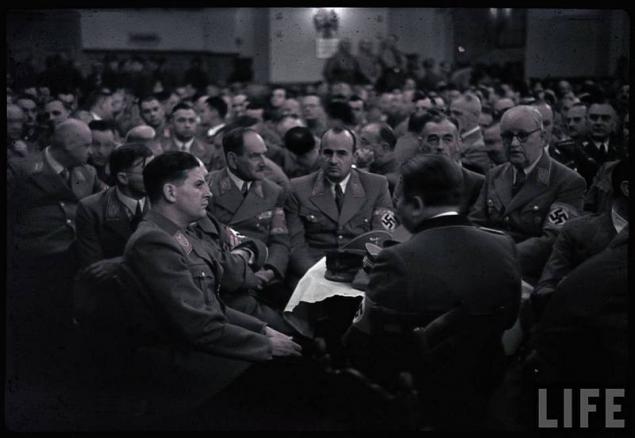
Source:
Munich, September 30, 1938
Seventy-one years ago, the head of the four powers signed an agreement known Bavarian capital. Let (with appreciation to the Life and Bundesarhivu) look at the actors and some decorations.
Let's start with the British Prime Minister Neville Chamberlain.

Four-conference was held in Munich Fuhrerbau (author of the project - Paul Troost). Construction of the building was over a year earlier.

Above each entrance - the two flags.

Spacious interiors are in a position to fruitful work for peace in Europe.

Honor guard at the Munich airport Oberwiesenfeld.

Back to Chamberlain. Two weeks before the conference of the four powers, he visited Bavaria. He met Hitler in Obersalzberg. The meeting outlined the main provisions of the future agreement.

After completing his short visit, Chamberlain immediately convened a Cabinet. His Majesty's Government has approved an agreement reached with Germany. The next day, Sept. 17, arrived in London the Prime Minister and the Foreign Minister of France, who were briefed on the outcome of the meeting and expressed their full support for the British colleagues.

So Chamberlain again in Munich.

Benito Mussolini arrived in Munich, not for peace or territorial gains. In Duce had other tasks which he successfully completed.

The man who for many years avoided traveling abroad, who recently was condemned by the League of Nations for its aggression against Abyssinia, who experienced acute political isolation of his regime, was now able to feel equal among equals.

Photographer Heinrich Hoffman captured Mussolini conversation with Chamberlain.

In the rough commoner Duce played only with those whom he considered beneath him on the situation. Before Chamberlain, he certainly appeared in the guise of an educated, witty and attentive interlocutor.

Edouard Daladier, the French Prime Minister, much enthusiasm at the airport experienced.

And car trip looked very pale, especially near Hermann Goering.

Great shot by Hugo Jaeger did - one of the "court photographer" Fuhrer!

Now it's called "photo-op". Protocol bleak picture.

Hitler got what he wanted.

It is done.

Finished business - walk safely.

That cheered Daladier. Especially a fellow traveler on the way back he came across a charming, knowing the French language - Joachim von Ribbentrop, the son of a large importer of sparkling wines. However, the fault could talk with Goering. But, apparently, it did not happen.

With Chamberlain Ribbentrop spoke explicitly about wine

Whatever it was - it was carried out with all the honors.

Chamberlain said goodbye to hospitable Munich and went to London to utter his famous paraphrase of Sunday prayers.

The Sudeten German troops entered the long-awaited. And shed tears of joy.

And in the Bavarian capital to do other things. In October, there was open hunting museum.

In November, it marks the 15th anniversary of the "Beer Hall Putsch". Here's a lover of music, he is the Führer of the German people and Reich Chancellor, at a rehearsal of the concert.

Oath of the SS on the anniversary.

A group of high reenactors.

And Viola kameraden divisible memories in the beer cellar "Lowenbrau". Soon many of them will fight.
Perhaps something where I broke the sequence. If you see exactly where - please specify.
And in fact events. Unforgettable Confucius said that a picture is worth a thousand words. In this case, these old photos are a great magazine article. What more? And yet I want to add something.
On 30 September 1938, I think it is very unfortunate for mankind. On this day, the leaders of Britain and France showed unpardonable levity for adults, giving bandit what he wanted. In the hope that the more he will not achieve anything. To those hopes dashed, it took very little time - a few months.
Munich was an attempt to patch up the ramshackle Treaty of Versailles. But on this day the Versailles system ceased to exist. There was a ghostly, entirely built on illusions and good intentions Munich world.
Chamberlain and Daladier did not want war. More than that - they were the elected leaders, forced to rely on public opinion. In autumn 1938 the war did not want to neither the French nor the British. Their prime ministers decided the difficult international problem for others - disfiguring friendly state - and thought, if nothing lost.
In London and Paris, stubbornly unwilling to ignore the obvious and see the light only after the entry of German troops into Prague - on what, in fact, Munich and the world over. But the deed was done.
Act as devil's advocate and say, like Chamberlain and Daladier could not see into the future and took the only right decision, I will not. The more that both of these policies later admitted that they had made a big mistake. However, the world of these confessions has not become easier.
You should never give in to blackmail - because the blackmailer is never limited achieved. This also applies to the Sudetenland, and peace in East Europe during the war. There ought to develop the idea, but limited to a few words: long-winded excuse Molotov-Ribbentrop Pact, sounded its 70th anniversary, in what I am not convinced. Because I had the good fortune to know the people, the war is not met the children and passed it from beginning to end - and these people believed that enter into a pact with Hitler should not have. How should not sign and the Munich agreement. The opinion of these people, who are no longer for me is much more important considerations of current authors.
Munich - not a precedent from a legal point of view. But it has no analogues agreement - a link in the chain of events that ended World War II. A very important part of which is impossible to forget.
Here, perhaps, and all.
via

Source:




